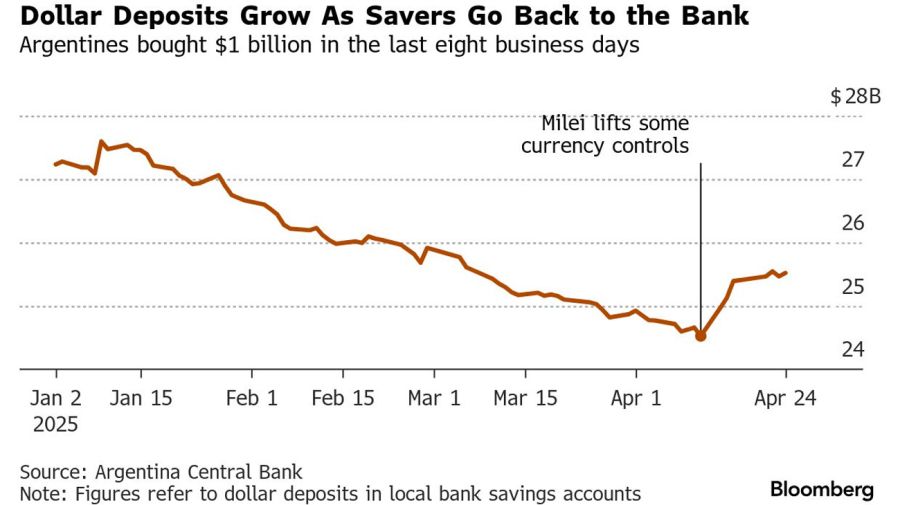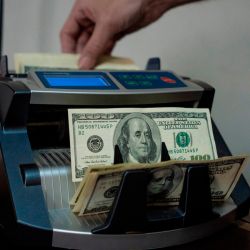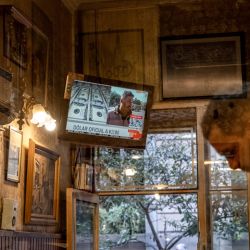Savers in Argentina are going back to the bank to buy dollars after President Javier Milei granted them complete freedom to do so after five years of strict currency controls, at a time when many view the greenback as cheap.
The government’s decision this month to ease restrictions has unleashed pent-up demand as individuals — so far the only ones authorised to freely obtain foreign currency — see a window in the favourable exchange rate, which is fuelled locally by seasonal flows.
Dollar holdings deposited into Argentine bank savings accounts rose by US$1 billion to US$25.5 billion in the first eight business days after the restrictions were lifted, after falling US$2.7 billion so far this year, according to Central Bank data.
Argentines have a long history of idealising the dollar. Recurring currency and current account crises in recent decades have taught them to turn to the greenback to shield their savings from inflation and devaluation. Convinced that every time the dollar looks cheap, it will inevitably appreciate again, they view the current weakness in the US currency as a buying opportunity.
“I’ve been hurt thousands of times,” says Federico Cuomo, the 50-year old owner of the Tronador water-bottling plant in Buenos Aires. Cuomo says he buys US$500 to US$1,000 a month and holds all his savings in greenback. “I feel that the dollar will rise against the peso.”
This is happening at a time when the peso is trading at its highest level in more than a decade when adjusted for inflation, according to Central Bank data.
Argentines are estimated to hold one of the largest stockpiles of dollars outside the US with over US$200 billion sitting beyond the formal financial system, according to Central Bank estimates. People keep that stash “under the mattress and God knows where,” Kristalina Georgieva, managing director of the International Monetary Fund, said last week. “If this money comes out and it works for Argentina, just imagine what the country will be like,” she added.

Argentines like Pedro Aboy are seizing the opportunity, aware that the moment may be short-lived. The 30-year-old merchant in the Buenos Aires suburb of Hurlingham exchanged pesos for US$800 earlier this month. “Everything is going up in price — cars, merchandise, except the dollar,” he said. “It’s very cheap to buy dollars.”
Despite the relentless demand from consumers, the official peso remains strong when adjusted for inflation, bolstered by seasonal inflows from grain exporters and foreign capital seeking returns in carry trades. The country’s Central Bank regained some firepower earlier this month after it received a US$12-billion disbursement from the IMF under its new programme.
“It’s natural that, when allowed to freely hoard dollars at a low exchange rate, people would rush to do so,” said Joaquín Cottani, an economist at Global Source Partners, who formerly served as deputy economy minister in Milei’s government.
Investors expected the peso to depreciate by more than 10 percent once the government eased restrictions, according to recent pricing in the futures market. But that hasn’t transpired. “Nothing magical happened to improve productivity, cut taxes, or boost competitiveness. The only thing that changed is that there are now more reserves,” Cottani said.
Seasonal inflows from the soybean harvest have injected fresh dollars into the market, temporarily strengthening the peso and reducing the cost of buying US dollars.
“This more appreciated exchange rate, which emerges from a free market, may not be compatible with the real fundamentals that make the current account sustainable,” said Guido Sandleris, a former governor of Argentina’s Central Bank and current professor at Universidad Torcuato Di Tella and Johns Hopkins University.
Historically, investors dollarise their portfolios in Argentina in the weeks leading up to a national election, fearing a result that could jeopardise the currency’s stability. Investments are usually closely tied to election expectations and the government’s confidence and approval ratings during these processes.
For one, JPMorgan advised clients to buy Treasury notes denominated in local currency — but only those maturing on August 15, two months before the national elections.
Confidence in Milei’s government fell in April for the fifth consecutive month, according to an index measured by Torcuato Di Tella University. The index declined 3.7 percent to 2.33 points. Approval ratings fell to 41.8 percent in April from 46.5 percent, according to political consulting firm AtlasIntel.
“Retailers always dollarise before elections, as a precaution,” said Alberto Ades, director at investment advisory firm NWI Management LP. But given Argentina’s fiscal surplus and the Central Bank’s commitment to a tight monetary policy, he believes this time will be different. “When the elections come, people won’t have enough pesos to run against the Central Bank.”
related news
by Ignacio Olivera Doll, Bloomberg
























Comments